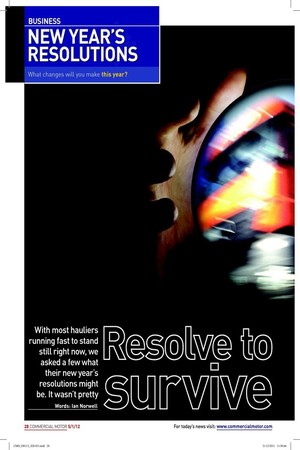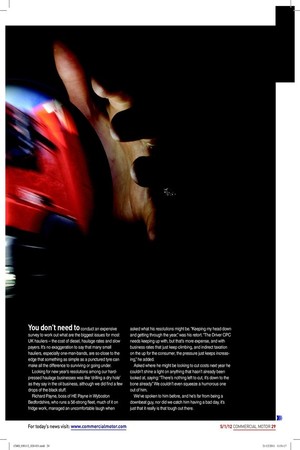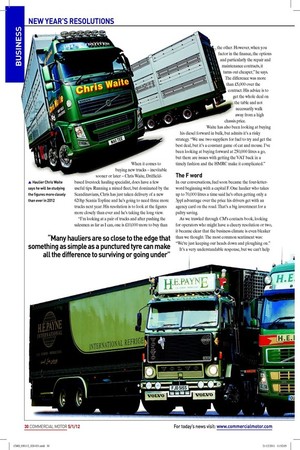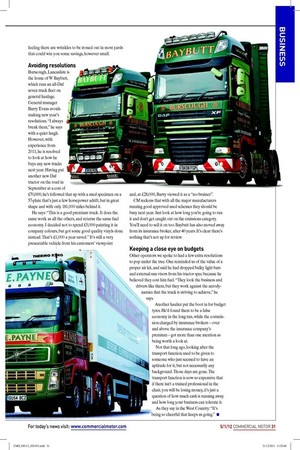BUSINESS
Page 24

Page 25

Page 26

Page 27

If you've noticed an error in this article please click here to report it so we can fix it.
NEW YEAR’S
‘
RESOLUTIONS
What changes will you make this year?
With most hauliers running fast to stand still right now, we asked a few what their new year’s resolutions might be. It wasn’t pretty
Words: Ian Norwell
You don’t need to conduct an expensive survey to work out what are the biggest issues for most UK hauliers – the cost of diesel, haulage rates and slow payers. It’s no exaggeration to say that many small hauliers, especially one-man-bands, are so close to the edge that something as simple as a punctured tyre can make all the difference to surviving or going under.
Looking for new year’s resolutions among our hardpressed haulage businesses was like ‘drilling a dry hole’ as they say in the oil business, although we did find a few drops of the black stuff.
Richard Payne, boss of HE Payne in Wyboston Bedfordshire, who runs a 56-strong fleet, much of it on fridge work, managed an uncomfortable laugh when asked what his resolutions might be. “Keeping my head down and getting through the year,” was his retort. “The Driver CPC needs keeping up with, but that’s more expense, and with business rates that just keep climbing, and indirect taxation on the up for the consumer, the pressure just keeps increasing,” he added.
Asked where he might be looking to cut costs next year he couldn’t shine a light on anything that hasn’t already been looked at, saying: “There’s nothing left to cut, it’s down to the bone already.” We couldn’t even squeeze a humorous one out of him.
We’ve spoken to him before, and he’s far from being a downbeat guy, nor did we catch him having a bad day, it’s just that it really is that tough out there. When it comes to buying new trucks – inevitable sooner or later – Chris Waite, Drifieldbased livestock hauling specialist, does have a few useful tips. Running a mixed leet, but dominated by the Scandinavians, Chris has just taken delivery of a new 620hp Scania Topline and he’s going to need three more trucks next year. His resolution is to look at the igures more closely than ever and he’s taking the long view. “I’m looking at a pair of trucks and after pushing the salesmen as far as I can, one is £10,000 more to buy than the other. However, when you factor in the inance, the options and particularly the repair and maintenance contracts, it turns out cheaper,” he says. The difference was more than £5,000 over the contract. His advice is to get the whole deal on the table and not necessarily walk away from a high chassis price.
Waite has also been looking at buying his diesel forward in bulk, but admits it’s a risky strategy. “We use two suppliers for fuel to try and get the best deal, but it’s a constant game of cat and mouse. I’ve been looking at buying forward at 250,000 litres a go, but there are issues with getting the VAT back in a timely fashion and the HMRC make it complicated.”
The F word
In our conversations, fuel soon became the four-letterword beginning with a capital F. One haulier who takes up to 70,000 litres a time said he’s often getting only a 3ppl advantage over the price his drivers get with an agency card on the road. That’s a big investment for a paltry saving.
As we trawled through CM’s contacts book, looking for operators who might have a cheery resolution or two, it became clear that the business climate is even bleaker than we thought. The most common sentiment was: “We’re just keeping our heads down and ploughing on.” It’s a very understandable response, but we can’t help feeling there are wrinkles to be ironed out in most yards that could win you some savings, however small.
Avoiding resolutions
Burscough, Lancashire is the home of W Baybutt, which runs an all-Daf seven truck leet on general haulage. General manager Barry Evans avoids making new year’s resolutions. “I always break them,” he says with a quiet laugh. However, with experience from 2011, he is resolved to look at how he buys any new trucks next year. Having put another new Daf tractor on the road in September at a cost of £70,000, he’s followed that up with a used specimen on a 57-plate that’s just a few horsepower adrift, but in great shape and with only 181,000 miles behind it.
He says: “This is a good premium truck. It does the same work as all the others, and returns the same fuel economy. I decided not to spend £5,000 painting it in company colours, but got some good quality vinyls done instead. That’s £1,000 a year saved.” It’s still a very presentable vehicle from his customers’ viewpoint and, at £28,000, Barry viewed it as a “no-brainer”.
CM reckons that with all the major manufacturers running good approved used schemes they should be busy next year. Just look at how long you’re going to run it and don’t get caught out on the emissions category. You’ll need to sell it on too. Baybutt has also moved away from its insurance broker, after 40 years. It’s clear there’s nothing that’s not up for review.
Keeping a close eye on budgets
Other operators we spoke to had a few extra resolutions to pop under the tree. One reminded us of the value of a proper air kit, and said he had dropped bulky light bars and external sun visors from his tractor spec because he believed they cost him fuel. “They look the business and drivers like them, but they work against the aerody namics that the truck is striving to achieve,” he says.
Another haulier put the boot in for budget tyres. He’d found them to be a false economy in the long run, while the commission charged by insurance brokers – over and above the insurance company’s premium – got more than one mention as being worth a look at.
Not that long ago, looking after the transport function used to be given to someone who just seemed to have an aptitude for it, but not necessarily any background. Those days are gone. The transport function is now so expensive that if there isn’t a trained professional in the chair, you will be losing money, it’s just a question of how much cash is running away and how long your business can tolerate it.
As they say in the West Country: “It’s being so cheerful that keeps us going.” ■













































